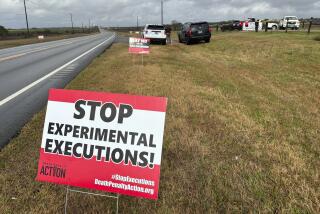Price of gas adds to town’s isolation
- Share via
COY, ALA. — The modest Japanese sedan made its way down the gravel drive between the cow pasture and the dirt basketball court, kicking up a cloud of dust before coming to rest beside Roy Saulsberry Jr.’s ancient gas pumps.
A passenger stepped out, clutching an old antifreeze jug. Outside Roy’s Grocery & Package store, the regulars were hemming and hawing on a wooden bench, under the spell of the afternoon’s slow rhythm.
Norman Finklea filled his jug just past a gallon, letting the analog meter come to rest at $3.88. Then he walked into Roy’s with his four crumpled bills and a litany of anxieties, which were rising with the price of gas.
He didn’t need to tell them to Saulsberry. As the proprietor of this little country store in one of the poorest counties in Alabama, Saulsberry has already heard them all. It doesn’t matter what kind of cars pull up to pumps these days -- stretchy old hooptie sedans, scuffed econo-boxes, king-cab pickups -- anxiety is their common cargo.
With the high price of gas, Saulsberry said, “people just can’t go as much.”
Finklea, a freelance construction worker, had paid a friend $5 to pick him up at his house a few miles down the road and drive him here. His own car was back at home with its pin on empty, he said. He needed it to drive to work in the morning.
Finklea said high gas prices were the reason he paid only half his light bill last month, the reason he and his wife were trying to get by with less food, the reason he is turning down jobs that are more than 30 miles away.
Those jobs, he said, are not worth driving to anymore.
Cheap gas, and cars to put it in, have long given Americans the freedom to roam. For the people of Coy -- a largely African American community of about 900, two hours southwest of Montgomery -- that freedom has been particularly vital, delivering them out of rural isolation and into decent, if far-flung, employment.
A generation ago, black laborers sharecropped cotton on white-owned land here. Others worked in nearby sawmills. By the 1960s, the mills were thriving, but small-scale farming was fading away, and the civil rights era had opened new job possibilities.
Those jobs, however, tended to be spread around the state. The people of Coy gassed up their cars and drove to them. They drove 13 miles on the two-lane highway to Camden, the county seat, or they ventured farther afield, to the bigger cities of Selma and Montgomery. They took manufacturing jobs and teaching jobs, handyman gigs and government desk work.
Today, gas money and a functioning car are still vital for workers who wish to leave this stretch of pastureland, low-slung houses and tumbledown trailers. The only public transportation is a regional van service that mostly shuttles the elderly to doctor’s appointments. There are only a few local farmhand jobs.
Though drivers across the nation are smarting from the rising price of gas, it is taking a particularly harsh toll here in Wilcox County, where the median household income is $17,500. A recent report by the Oil Price Information Service estimated that residents spend more than 13% of their monthly income on gas -- the highest ratio in the nation. (The study, which also took into account local gas prices and commuting statistics, found that the average Los Angeles County household spends 3.9% of its monthly income on gas.)
Roy’s Grocery has long served as a sort of home base for commuters: a place to buy a few gallons, get a six-pack of beer, catch up with friends. But the price of gas -- which was $3.51 per gallon at Roy’s earlier this month -- has changed some things. Clarence Perryman, a retired construction worker, has been a fixture for years at the store, watching his neighbors come and go.
“They used to pull up and say, ‘Fill it up,’ ” he said. “Not anymore.”
--
It was an argument over gas money that prompted Saulsberry to build the grocery in the first place, in the mid-1990s. A clerk at a now-defunct Coy convenience store had accused him of failing to pay for a fill-up. She was a white woman. He suspected it was a racial thing.
At the time, there were two stores in town -- both with white owners. Saulsberry recalled telling his father, Roy Saulsberry Sr.: “If I ever get able, I will put up a store here in Coy. I don’t care if I ever make money off it.”
Soon after, the two men, who are partners in a contracting business, began constructing a utilitarian cinder-block building with a metal roof. Today, the outside is painted a creamy tapioca. Inside are a few shelves of snack foods, a refrigerator with beer and soda, and candy and cigarettes behind a long counter.
Behind the register, a clerk can watch through a little window covered in burglar bars as customers pull up to the old silver-and-white pumps. On the other side of the building, the Saulsberrys have set up a spartan pool hall, with three billiard tables and a boombox.
Father and son wanted it to be not just a store but an informal community center. But to make it work, the younger Saulsberry figured, it was crucial to sell gas. It was the product people needed most. It was the lure that would tempt them to stop, and perhaps linger.
It took Saulsberry six months to find someone who would bring a little gas out this far -- a distributor from Mobile, 125 miles away. She eventually insisted that he order a minimum of 4,000 gallons a month, which was much more than he needed. These days, he hauls the gas himself from a neighboring county, making the trip in a 1-ton truck with a tank in the back. He brings back about 300 gallons twice a week.
Saulsberry, 45, is a compact man, laconic and soft-spoken, with tired eyes set in a genial face. He has one foot in the 21st century, with a cellphone holster glued to his hip and a teenage son who will travel to Europe to study this summer.
But the Old South is alive in his world, too. He is the grandson of sharecroppers; a funeral program for his late mother hanging above the store counter notes that her father’s nickname was “Sambo.” The lowing of cows in the adjacent pasture occasionally penetrates the store’s interior, where pickled pigs’ lips in pale pink brine await hungry customers.
Saulsberry has been trying for years to transform Coy from a place that people have to leave into a place that gives them a reason to stay. He helped found the little volunteer fire department and ran unsuccessfully for a county commission seat in the late 1980s. These days, he’s trying to find a $1,500 grant to pave the dirt basketball court next to the store.
He’d be happiest if Coy could attract a decent-size manufacturing plant, so people wouldn’t have to travel so far to work. Until it does, he figures he will keep hauling the gas from Thomasville, as a kind of public service.
His gas is more expensive than the gas over in Camden. Saulsberry says he has to pay a higher wholesale price because he doesn’t buy much; he also buys premium gas, though he doesn’t advertise that to his customers. “I just tell ‘em I got good gas,” he said. “Cheaper isn’t always better.”
He pockets about 10 cents a gallon -- just enough to pay the store’s light bill.
--
The store’s faded wooden sign still bears the hand-painted price for a gallon of unleaded from some distant time: $1.23 9/10. A cousin usually opens the place in late morning. Most customers come in the evening, after their shifts, buying their gas with cash, and a gallon or two at a time.
Sam Knight, 61, pulled up in a blue van and pumped $8 worth. Knight had a heart attack last year; since then, he said, he has missed cardiologist appointments because he can’t afford to drive the 100 miles to Selma and back.
Spencer Byrd Jr., 47, tries to buy his gas at the stores in Camden, where it’s cheaper, but he visits Roy’s from time to time. He said he used to run a lawn-care service to supplement his job as a maintenance man at the post office. But gas prices forced him to shut down the lawn business last fall.
William Coleman, 53, has been driving the 30 miles to and from his plywood mill job for 17 years. To save on gas, he has recently taken to sleeping in the boiler room between 12-hour shifts. Coleman usually stays overnight twice a week, leaving his wife to deal with the two grandchildren they are raising.
“My biggest problem,” he said, “is gas.”
As the sun went down on a recent Wednesday, the regulars monopolized the wooden bench, gossiping and talking politics. Perryman, the retiree, thumbed through the local paper, with its back page used-car ad that screamed “GAS SAVERS.” Neighbors ambled across the basketball court in twos and threes, looking for a snack. A man pulled up and filled the tank of an old motorbike that was missing its gas cap. A woman drove up and filled half of a pickle jar.
Jamison Jones, 26, said he has been looking for a construction job since being laid off six months ago. The good jobs, he said, are in Montgomery and Mobile. Even if he got one of those jobs, he’d have to find someone to carpool with -- someone with the same job, the same shift, “same everything,” he said.
Of course, Jones could just move, like others who have left Wilcox County to be closer to good jobs. Francis B. Dobson Jr., assistant director of the Alabama-Tombigbee Regional Commission, a local planning agency, said those people may benefit from a short commute, but they make their struggling home county that much poorer.
“When the best and the brightest leave your county,” he said, “what have you got left?”
Finklea, the man with the full jug of gasoline, doesn’t plan on moving. He grew up around here, and this summer he will pay off the mortgage on his double-wide trailer. If the price of gas becomes intolerable, he said, he will find a way to survive in Coy.
“I guess I’ll get on food stamps,” he said. “And kill me a couple of deers and rabbits.”
Finklea jumped in the waiting sedan, which soon disappeared up the road.
Saulsberry wandered outside of his store to the thrum of crickets and waited for the next customer to come rolling up the drive.
--
More to Read
Sign up for Essential California
The most important California stories and recommendations in your inbox every morning.
You may occasionally receive promotional content from the Los Angeles Times.










